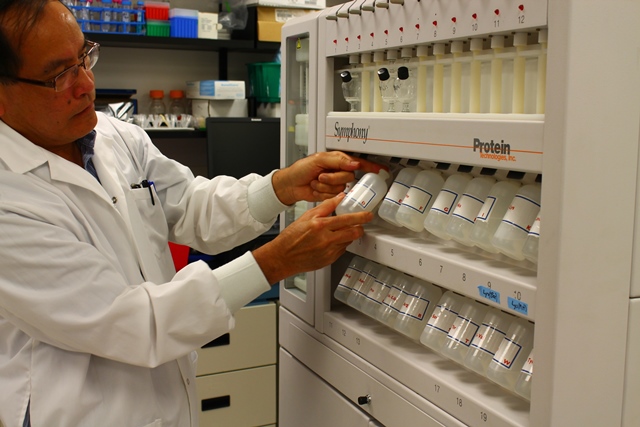By Maggie Frampton
Ontario has higher rates of smoking than the provincial and national average. Over 45,000 Canadians die from smoking related diseases each year. There is an undeniable link between smoking and cancer, heart and lung diseases.
Dr. Hoang-Thanh Le, Scientist at Health Sciences North Research Institute, the research institute for Health Sciences North in Sudbury, Ontario, has received funding from the Canadian Institutes of Health Research (CIHR) for the development of an intranasal vaccine using a novel adjuvant delivery system.
The vaccine is showing promising preliminary results. “Only a small group of people see long term success with the current smoking cessation options. The nicotine vaccine would be a likely option for treatment that suppresses the addiction”, says Dr. Le.
Dr. Le has been developing the vaccine since 2011 when he first received support from Grand Challenges Canada and Northern Cancer Foundation. The project involves collaborations with partners at the Centre for Addictions and Mental Health in Toronto, Ontario; Health Sciences North Research Institute in Sudbury, Ontario; Pasteur Institute in Ho Chi Minh City, Vietnam; and Indian Institute of Science Education and Research in Kolkata, India.
Dr. Le and his team propose to develop a new vaccination strategy targeting the lungs, which offers an effective treatment that can sequester nicotine in the airways and limit its entry into the brain. Preliminary results show that levels of nicotine in the brains of vaccinated mice were four times lower than those not vaccinated. The new proposed strategy, which is easily administered through the nose, skin or under the tongue, could be able to aid people who smoke to successfully quit and also to prevent smoking.
“We are very excited for Dr. Le and his research team for receiving funding from CIHR. The development of this research will help many patients in Northern Ontario and beyond”, says Dr. McElhaney, Vice President of Research & Scientific Director at Health Sciences North Research Institute.
Dr. Le anticipates starting human clinical trials once all safety and efficacy testing has been concluded in animals. This vaccine would benefit patients by reducing the risk of cancers, heart disease and stroke.
The vaccine will not require any needles making it more cost effective than traditional vaccines. This safe and effective approach to vaccination could be further developed for other addictions such as cocaine, heroin, and methamphetamine.
Maggie Frampton is a Communications Specialist at Health Sciences North.




